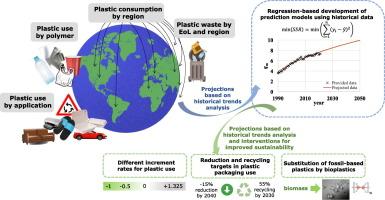Global projections of plastic use, end-of-life fate and potential changes in consumption, reduction, recycling and replacement with bioplastics to 2050
IF 10.9
1区 环境科学与生态学
Q1 ENVIRONMENTAL STUDIES
引用次数: 0
Abstract
Excessive production, indiscriminate consumption, and improper disposal of plastics have led to plastic pollution and its hazardous environmental effects. Various approaches to tackle the challenges of reducing the plastic footprint have been developed and applied, such as the production of alternative materials (design for recycling), the production and use of biodegradable plastic and plastics from power-to-X, and the development of recycling approaches. This study proposes an optimisation strategy based on regression to evaluate and predict plastic use and end-of-life fate in the future based on historical trends. The mathematical model is formulated and correlations based on functions of time are developed and optimised by minimising the sum of squared residuals. The plastic quantities up to the year 2050 are projected based on historical trends analysis, and for improved sustainability, projections are additionally based on intervention analyses. The results show that the global use of plastics is expected to increase from 464 Mt in 2020 up to 884 Mt in 2050, with up to 4725 Mt of plastics accumulated in stock in 2050 (from the year 2000). Compared to other available forecasts, a slightly lower level of plastic use and stock are obtained. The intervention analysis estimates a range of global plastics' consumption between 594 Mt and 1018 Mt in 2050 by taking into account its different increment rates (between −1 % and 2.65 %). In the packaging sector, the implementation of reduction targets (15 % reduction in 2040 compared to 2018) could lead to a 27.3 % decrease in plastic use in 2050 as compared to 2018, while achieving recycling targets (55 % in 2030) would recycle >75 % of plastic packaging in 2050. The partial substitution of fossil-based plastics with bioplastics (polyethylene) will require significant land area, between 0.2 × 106 km2 for obtaining switchgrass and up to around 1.0 × 106 km2 for obtaining forest residue (annual yields of 58.15 t/ha and 3.5 t/ha) in 2050. The intervention analysis shows that proactive policies can mitigate sustainability challenges, however achieving broader sustainability goals also requires reduction of footprints related to energy production and virgin plastic production, the production of bio-based plastics, and the full implementation of recycling initiatives.

到 2050 年全球塑料使用量、报废转归以及在消费、减少、回收和用生物塑料替代方面的潜在变化预测
塑料的过度生产、任意消费和不当处置导致了塑料污染及其对环境的危害。为应对减少塑料足迹的挑战,人们开发并应用了各种方法,如生产替代材料(循环利用设计)、生产和使用生物降解塑料和 "电转X "塑料,以及开发循环利用方法。本研究提出了一种基于回归的优化策略,根据历史趋势评估和预测未来塑料的使用和报废情况。通过最小化残差平方和,建立了数学模型和基于时间函数的相关性,并对其进行了优化。根据历史趋势分析预测了到 2050 年的塑料数量,为了提高可持续性,还根据干预分析进行了预测。结果显示,全球塑料使用量预计将从 2020 年的 4.64 亿吨增加到 2050 年的 8.84 亿吨,2050 年的塑料库存量将达到 4.725 亿吨(从 2000 年算起)。与其他现有预测相比,塑料使用量和库存量略低。考虑到不同的增长率(-1 % 到 2.65 %),干预分析估计 2050 年全球塑料消费量在 5.94 亿吨到 1.018 亿吨之间。在包装领域,实施减量目标(2040 年比 2018 年减少 15%)可使 2050 年的塑料使用量比 2018 年减少 27.3%,而实现回收目标(2030 年达到 55%)则可在 2050 年回收 75% 的塑料包装。到 2050 年,用生物塑料(聚乙烯)部分替代化石基塑料将需要大量的土地面积,获取开关草的土地面积在 0.2 × 106 平方公里之间,获取森林残留物的土地面积高达约 1.0 × 106 平方公里(年产量分别为 58.15 吨/公顷和 3.5 吨/公顷)。干预分析表明,积极的政策可以缓解可持续性挑战,但要实现更广泛的可持续性目标,还需要减少与能源生产和原始塑料生产、生物基塑料生产相关的足迹,并全面实施回收措施。
本文章由计算机程序翻译,如有差异,请以英文原文为准。
求助全文
约1分钟内获得全文
求助全文
来源期刊

Sustainable Production and Consumption
Environmental Science-Environmental Engineering
CiteScore
17.40
自引率
7.40%
发文量
389
审稿时长
13 days
期刊介绍:
Sustainable production and consumption refers to the production and utilization of goods and services in a way that benefits society, is economically viable, and has minimal environmental impact throughout its entire lifespan. Our journal is dedicated to publishing top-notch interdisciplinary research and practical studies in this emerging field. We take a distinctive approach by examining the interplay between technology, consumption patterns, and policy to identify sustainable solutions for both production and consumption systems.
 求助内容:
求助内容: 应助结果提醒方式:
应助结果提醒方式:


